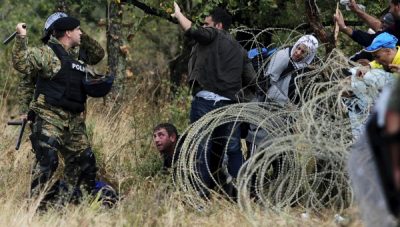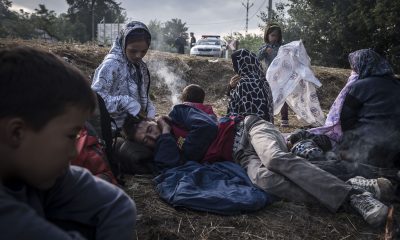By
Rupen Savoulian
The scandal is not the mass migration of refugees into Europe – the scandal is how the European Union is treating them.
The United Nations Commission on Human Rights reported in April 2016 that as many as 500 refugees have drowned in the Mediterranean Sea, attempting to cross into Europe. Their boat, crammed with asylum seekers from Ethiopia, Eritrea, Somalia, the Sudan and other countries, sank off the coast of Libya. This mass fatality occurred a year after a similar mass drowning of refugees, the latter escaping war and desperate conditions in their home countries.
In April 2015, the corporate media broadcast images of fleeing refugees, each family with their story of survival against the odds. The body of Aylan Kurdi, the Syrian Kurdish refugee boy who drowned while attempting to reach European territory with his family, became the main defining image of the plight of refugees, sacrificing their all to reach their dream – a better, peaceful and prosperous life in Europe.
Along with the images of the quiet sadness of the refugees, we are witnessing other images on our screens – the razor-wire fences, the militarised borders, the soldiers and police officers patrolling the territories where refugees have landed or been incarcerated by the authorities. The European Union is resurrecting its securitised borders, building a lethal fortress that is responding with force against the mass migration of people from the Middle East and Africa.
Back in 1989, European capitalist governments were tearing down walls, hailing the demolition of the Berlin Wall, and subsequent opening up of the former Eastern bloc, as a great triumph for the people of Europe. No longer would European people be divided by authoritarian regimes, but united with a common purpose in a liberal democratic fraternity. The foreign ministers of the two European states of Austria and Hungary staged a media event, whereby they cut a hole in the barbed wire fence that had symbolised the separation of Eastern and Western Europe.
Here we are in 2016, and the borders of capitalist Europe are being restored – not only to exclude refugees fleeing from terrorism and violence in their home countries, but also to abolish intra-European agreements, such as the Schengen agreement, a formalised treaty that abolished border controls between member states of the European Union. In an article for Tuck Magazine, Anant Mishra writes that the European Union is abandoning the abandoned; leaving the refugees to their fate, the Mediterranean is acting as a kind of geographical and increasingly militarised barrier, a huge and lethal obstacle for refugees to face if they decide to make the perilous journey to Europe. Thanks to the measures enacted by the European Union, the Mediterranean sea is the most dangerous sea route in the world. Mishra assembles an impressive array of statistics in his article, demonstrating that the Mediterranean has proven to be a lethal fence for fleeing migrants and refugees.
Make no mistake – the deaths of the refugees in the Mediterranean sea is not only a humanitarian tragedy, but a crime. It is a mass fatality for which the European authorities in Berlin, Paris, Brussels and other European capitals are responsible. As Richard Seymour explains in his article ‘Europe’s Lethal Fortress’, the refugees are fleeing from countries devastated by wars and violence, wars for regime change encouraged and sponsored by the European imperialist states. Not only have the European governments drastically ramped up their border controls and maritime surveillance, they have carried out predatory wars of conquest, disguised as humanitarian ‘regime change’ operations, that have left countries in a catastrophic state. The foreign policy objectives of the imperialist states have left a swathe of destruction and failed states in their wake. It is not entirely surprising that refugees are escaping from the fractured, lawless state of Libya, a country devastated by the NATO-driven 2011 bombing campaign. By whatever measures one uses, Libya is now a failed entity, divided into constantly warring regions and competing bands of armed militias that enforce their rule in the regions they occupy with terrifying violence.
As the writers for TeleSurTV observe, the imperialist powers bear directly responsibility for the crisis in Libya. Britain, France, Germany – aided and abetted by the United States and the United Kingdom – encouraged a war for regime change, toppling the previous government of Colonel Muammar Qadaffi, and turning it into a country where there is no single government, no security, oil revenues have declined, and the country is saturated with weapons and arms smuggling. The destruction of a functioning society, apart from being a case of sociocide, only results in the outflow of desperate refugees. Rather than admit their culpability, the political leaders of Europe – and the United States – have either tried to rationalise the Libya intervention as a chaotic transition to democracy, or as President Barrack Obama stated, a well-intentioned intervention that unfortunately became a mistake.
Veteran activist and anti-war campaigner Professor Noam Chomsky made the political connections between these factors of increased refugee outflow and European war-making in the Middle East when he stated:
“the US-UK invasion of Iraq … dealt a nearly lethal blow to a country that had already been devastated by a massive military attack twenty years earlier followed by virtually genocidal US-UK sanctions. The invasion displaced millions of people, many of whom fled and were absorbed in the neighboring countries, poor countries that are left to deal somehow with the detritus of our crimes. One outgrowth of the invasion is the ISIS/Daesh monstrosity, which is contributing to the horrifying Syrian catastrophe. Again, the neighboring countries have been absorbing the flow of refugees. The second sledgehammer blow destroyed Libya, now a chaos of warring groups, an ISIS base, a rich source of jihadis and weapons from West Africa to the Middle East, and a funnel for flow of refugees from Africa.”
That quote comes from a powerful article published in Common Dreams magazine by Rajesh Makwana entitled ‘The Global Refugee Crisis: Humanity’s last call for a culture of sharing and cooperation’. Makwana responds to a number of anti-refugee and anti-immigrant myths peddled by ultra-right parties in Europe regarding the mass movement of refugees. For instance, Makwana rebuts the oft-repeated claim, recycled by the corporate media, that Europe is facing a mass influx of refugees. Let us be clear about this – Europe is currently facing the largest mass migration of refugees since the end of World War Two. European governments have been confronted – throughout 2015 and 2016 – with the largest mass movement of displaced peoples since 1945. That much is true. However, there is a crucial point to bear out here – the largest burden of coping with refugees has fallen not on the European countries, but on other already-poor Middle Eastern states. Lebanon has already taken millions of Syrian refugees, and its hospitality is being stretched to the limit. As Makwana elaborates in his article:
The real emergency is taking place outside of Europe, where there is a desperate need for more assistance from the international community. For example, Turkey is now home to over 3 million refugees; Jordan hosts 2.7 million refugees – a staggering 41 percent of its population; and Lebanon has 1.5 million Syrian refugees who make up a third of its population. Unsurprisingly, social and economic systems are under severe strain in these and the other countries that host the majority of global refugees – especially since they are mainly based in developing countries with soaring unemployment rates, inadequate welfare systems and high levels of social unrest. In stark comparison (and with the notable exception of Germany), the 28 relatively prosperous EU member states have collectively pledged to resettle a mere 160,000 of the one million refugees that entered Europe in 2015. Not only does this amount to less than 0.25% of their combined population, governments have only relocated a few hundred have so far.
Europe is not facing a mass invasion of refugees and migrants, nor is it likely to be swamped or overwhelmed with demands on its economic and social systems. If public resources and facilities are being taxed to the limits of their capacities, it is not because of the refugee intake, but because of the severe austerity cutbacks implemented by various capitalist governments across Europe in the name of budgetary constraints and fiscal responsibility. Even august publications such as the Financial Times are compelled to admit that economic growth across the European Union remains sluggish and fragile.
Refugees warm near the fire as they wait for escort being detained by Hungarian police after crossing the Serbia-Hungaria border outside Asotthalom, Hungary, Sunday August, 23, 2015. (Photo Sergey Ponomarev for The New York Times)
One particular slanderously false allegation against the incoming refugees involves the spurious assertion that the militants of the Islamic State of Iraq and Syria (ISIS) are taking advantage of the chaotic situation and smuggling themselves into Europe among the refugees. This falsity has been circulated in various guises around social media, and has contributed to a climate of fear and xenophobic hatred against the refugees. No less an authority than Europol – the European Union’s own law enforcement agency – has stated that while ISIS do plan attacks in Europe, none of those planned assaults involve sneaking in terrorists as refugees. In the wake of the Paris and Brussels bombings, politicians of various stripes have incited further hatred of refugees, conflating them with ISIS militants and stoking security fears of the outsider, the Islamic foreigner, that supposedly intends harm on the European (and by implication, Christian) way of life and culture.
Perhaps this is not the most scholarly way to address this issue, however, let us reiterate the words of an article by journalist Philip Kleinfeld in Vice magazine: “Calling Bullshit on the anti-refugee memes flooding the internet”. The bizarre tropes being recirculated and regurgitated on social media sites are astounding to witness – the fake photographs, lurid stories, pictures of bearded men holding guns, confronting images of hulking bodybuilder-types among the refugees seeking entry into Europe – who actually turn out to be hulking bodybuilders, and no more.
But let us give the benefit of the doubt to the anti-refugee parties. Suppose that ISIS militants are hiding among refugees, even though ISIS, with all its financial resources, can actually infiltrate Europe using fake legal documentation. Be that as it may, let us suppose for a moment that all refugee mass migration must be forcefully stopped because of the possibility that ISIS militants might be among them. This is guilt by association – so let’s take this
Is the above a far-fetched scenario? Perhaps – but it has happened. The Panama Papers – the one year investigation by a team of reporters into the criminalised finance system – reveals that the financial class, the merchant and investment speculators, lured by dizzying dreams of economic reward, have systematically rorted the system, establishing tax havens and using their connections to launder enormous sums of money for personal gain. The criminalisation of the banking-finance sector was laid bare for all to see, and this is just the tip of the iceberg.
If anything, the Panama Papers reveal a system of institutionalised greed – and it demonstrates that capitalism is working very well. The obscenely-rich are doing rather well in this system, with tax havens and laundering money being an integral part of the capitalist system. Rather than demanding an immediate crackdown on the culprits and the building of borders or barriers to stop this global corruption, the corporate media are bragging about how efficiently the capitalist system is operating. In fact, the criminality of tax havens and money laundering is being openly denied, with the need to move large amounts of capital across borders being viewed as just another normal part of the global workings of the capitalist financial architecture. No strident condemnations of criminal behaviour here; no calls to crack down on money launderers and financial smuggling.
The European Union was always structured, modified and refined to serve the needs of big capital, not the needs of its human population. Europe, despite its universalistic declarations, was never an institution dedicated to improving the welfare of the common people, but a cross-national attempt by the ruling classes of Europe to subsume their own intra-European antagonisms and combine to fight off the challenges of American imperialism. After reabsorbing the Eastern bloc into its orbit, the European Union as an economic community changed its mission. Western Europe, being the seat of large western multinational corporations, sought to break into the Eastern bloc as a market. Having achieved that aim in 1989, the European Union set out on an optimistic crusade to maintain a facade of inter-European unity while facing external challenges from rival capitalist powers.
The European Union is disintegrating before our very eyes, with the rebuilding of walls, fences and military measures which had once been declared unnecessary. The Franco-German axis, the lynchpin of Western Europe remains solid, but the class and regional divisions that had been on the back-burner during the last twenty years have now risen to the surface. Inter-European rivalry has re-emerged in the wake of the failing health of the capitalist system. The naked force being used by the European ruling classes against the refugees is a reflection of the naked fear they are experiencing, as their financial system crumbles to pieces. As the spectre of capitalist failure haunts Europe, it is time to restructure the global economy to respond to human needs and social welfare, not as a conduit for corporate profits.




No Comments Yet!
You can be first to comment this post!